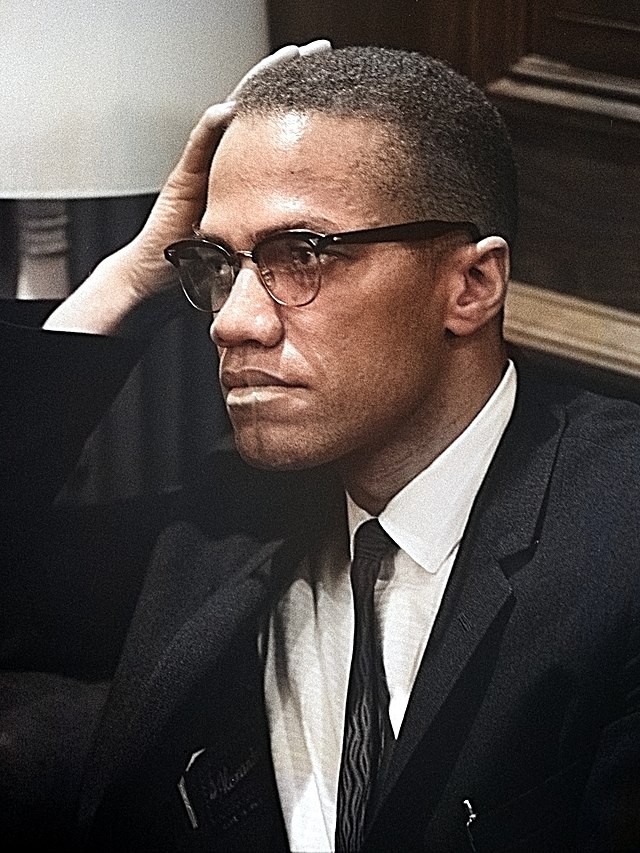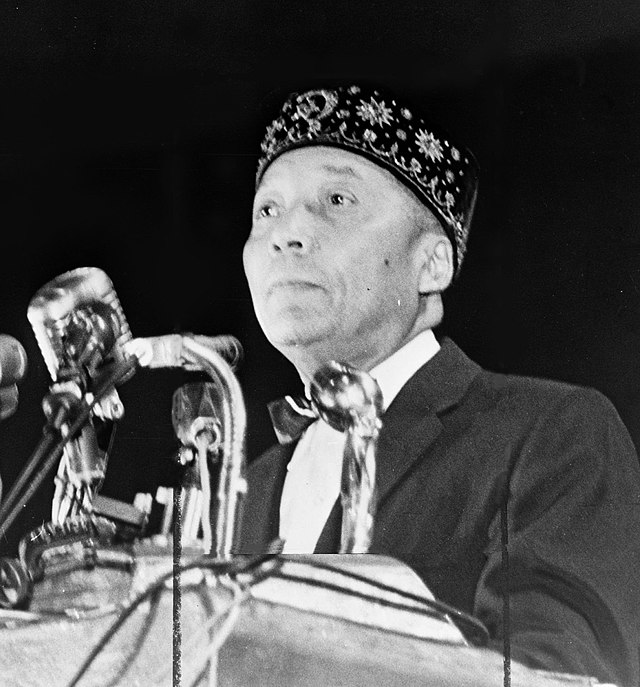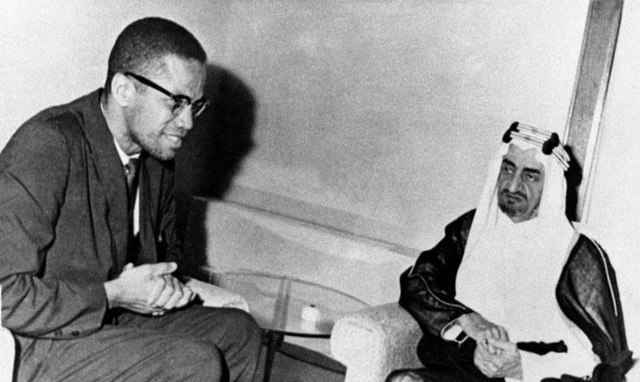Malcolm X's Journey to Sunni Islam

By: Mehdi El Merini / Arab America Contributing Writer
Malcolm X, born Malcolm Little in 1925, is often remembered as one of the most polarizing and transformative figures of the 20th century. His journey from a troubled youth to one of the most influential voices for Black empowerment was deeply intertwined with his conversion to Islam—a spiritual shift that profoundly altered both his personal identity and political message. Malcolm’s encounter with Islam wasn’t a straightforward path but rather a multi-layered transformation, punctuated by disillusionment, self-discovery, and growth.
This article traces Malcolm’s spiritual evolution—from the Nation of Islam (NOI), a controversial group rooted in Black nationalism, to mainstream Sunni Islam, which he embraced towards the end of his life. His journey reflects not just a change in faith but a deeper ideological shift, one that reshaped how he viewed race, unity, and justice.
Malcolm X’s Early Life and Search for Identity
Malcolm Little’s early years were marked by trauma and instability. Raised by parents involved in Marcus Garvey’s pan-African movement, Malcolm witnessed firsthand the harsh realities of racism. His father’s death, widely suspected to be a lynching by white supremacists, and his mother’s subsequent institutionalization led him into a life of crime and hustling in Boston and Harlem. Alienated from mainstream American society, Malcolm found belonging in the streets, where survival meant abandoning conventional moral frameworks.
In 1946, Malcolm was arrested for burglary and sentenced to ten years in prison. It was within the confines of prison walls that the first seeds of his spiritual awakening were planted. His siblings, who had joined the Nation of Islam under the leadership of Elijah Muhammad, began corresponding with him, urging him to reform his ways and embrace the NOI’s teachings. Although initially skeptical, Malcolm’s isolation gave him the space to reflect on his life and search for something greater than material pursuits.

The Nation of Islam: A Catalyst for Change
Malcolm’s formal engagement with the Nation of Islam in prison marked a profound turning point. The NOI, with its emphasis on Black self-sufficiency, pride, and resistance to white oppression, offered Malcolm a sense of purpose and clarity. Its teachings resonated with his personal experiences of racism, presenting a worldview where the suffering of African Americans was part of a divine narrative. Central to the NOI’s message was the belief that white people were inherently evil—an idea that, while controversial, deeply appealed to Malcolm during a time when racial injustice dominated his reality.
By the time Malcolm left prison in 1952, he was no longer the petty criminal from Harlem. He adopted the name “Malcolm X,” symbolically rejecting the surname “Little,” which he viewed as a legacy of slavery imposed by white oppressors. His dedication to Elijah Muhammad and the NOI was total, and he quickly rose to become the movement’s most visible spokesperson. Through speeches and writings, Malcolm X condemned not only the institutional racism of America but also the passive, nonviolent resistance strategies championed by other civil rights leaders, such as Martin Luther King Jr.
For Malcolm, the Nation of Islam provided more than religious meaning; it was a vehicle for political liberation. However, as his stature grew, tensions began to arise between him and Elijah Muhammad. Malcolm’s rising popularity threatened the hierarchy within the NOI, and he became increasingly disillusioned with the organization’s rigidity and internal corruption.
Breaking Away: Crisis and Transformation
The turning point came in 1963, when Malcolm was silenced by Elijah Muhammad for publicly commenting on President John F. Kennedy’s assassination, referring to it as “chickens coming home to roost.” This marked the beginning of Malcolm’s estrangement from the NOI, and in 1964, he formally announced his departure from the organization. It was a period of profound crisis for Malcolm, as he grappled with the loss of the ideological framework that had given his life meaning for over a decade.
At this pivotal moment, Malcolm sought to rebuild his identity—and it was Islam, in a more universal sense, that offered him a way forward. No longer bound by the dogma of the NOI, he embarked on a pilgrimage to Mecca, known as the Hajj, a mandatory spiritual journey for all Muslims who are able to undertake it.

The Hajj: A Revelation of Universal Brotherhood
Malcolm’s pilgrimage to Mecca in April 1964 was transformative on multiple levels. For the first time, he experienced Islam in its purest form—not as a political ideology but as a global faith rooted in unity, humility, and submission to God. The experience shattered many of his preconceived notions about race. In Mecca, he prayed alongside Muslims of all races, including white men whose sincerity and kindness challenged his previously rigid view of whiteness.
In letters written during the Hajj, Malcolm expressed profound revelations. He described feeling overwhelmed by the sense of brotherhood among Muslims from diverse ethnic backgrounds, stating that Islam could serve as a blueprint for resolving the racial divisions plaguing the United States. “I have seen what I never thought was possible,” he wrote, “true brotherhood practiced by all colors together.”
This shift in perspective marked the beginning of a new phase in Malcolm’s life. Upon returning from Mecca, he adopted the name El-Hajj Malik El-Shabazz, reflecting his newfound commitment to Sunni Islam. He also began preaching a message of global solidarity, advocating for unity among oppressed people regardless of race or nationality.

A New Vision for Justice
Malcolm’s embrace of Sunni Islam did not mean abandoning his fight for justice. However, his approach became more inclusive, emphasizing solidarity across racial and ethnic lines. While he remained critical of American racism, his rhetoric softened, and he sought to build alliances with civil rights leaders and activists from other communities. His focus shifted from framing the struggle as a purely Black vs. white issue to seeing it as part of a global fight against oppression.
This ideological evolution made Malcolm’s message even more potent—but also more dangerous. His growing influence and break from the NOI created new enemies, both within the organization and beyond. On February 21, 1965, Malcolm X was assassinated while preparing to address a crowd in Harlem. Though the exact circumstances of his death remain the subject of debate, his legacy endures as a symbol of transformation, resilience, and unwavering commitment to justice.
Malcolm X’s Enduring Legacy
Malcolm X’s journey to Islam was far more than a religious conversion—it was a process of deep personal and ideological transformation. From the narrow framework of the Nation of Islam to the universal embrace of Sunni Islam, Malcolm’s evolving beliefs reflected his search for truth and justice in an unjust world. His pilgrimage to Mecca was not just a spiritual awakening but a moment of clarity that reshaped his understanding of race, identity, and the possibility of unity. Even in death, Malcolm’s legacy endures as a testament to the power of faith, self-reinvention, and the relentless pursuit of liberation for all people.
Check out our blog here!








